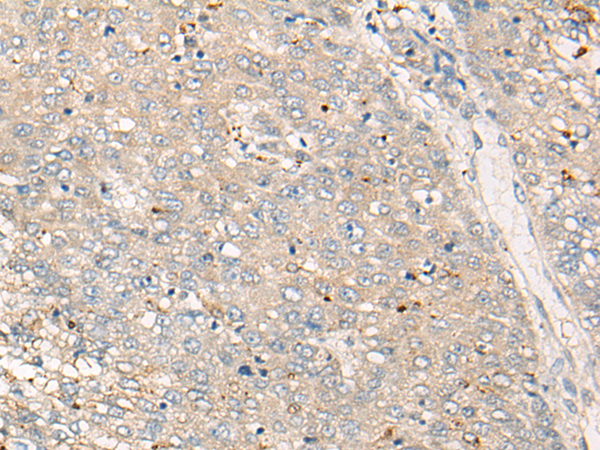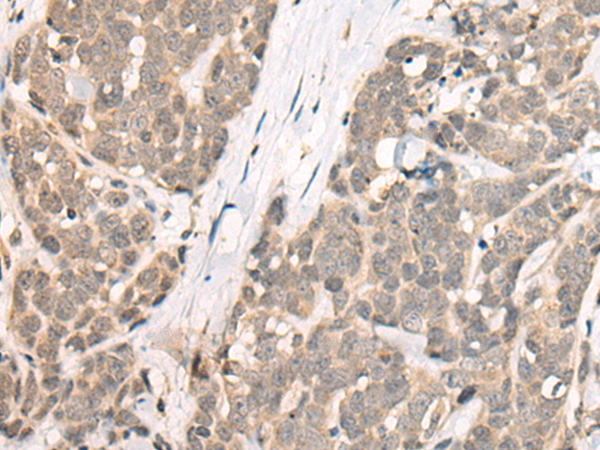

| WB | 咨询技术 | Human,Mouse,Rat |
| IF | 咨询技术 | Human,Mouse,Rat |
| IHC | 1/25-1/100 | Human,Mouse,Rat |
| ICC | 技术咨询 | Human,Mouse,Rat |
| FCM | 咨询技术 | Human,Mouse,Rat |
| Elisa | 1/5000-1/10000 | Human,Mouse,Rat |
| Aliases | IMD39; IRF-7; IRF7A; IRF7B; IRF7C; IRF7H; IRF-7H |
| Host/Isotype | Rabbit IgG |
| Antibody Type | Primary antibody |
| Storage | Store at 4°C short term. Aliquot and store at -20°C long term. Avoid freeze/thaw cycles. |
| Species Reactivity | Human, Mouse |
| Immunogen | Synthetic peptide of human IRF7 |
| Formulation | Purified antibody in PBS with 0.05% sodium azide and 50% glycerol. |
+ +
以下是关于IRF7抗体的3篇参考文献及其简要摘要:
---
1. **文献名称**: *IRF7 is the master regulator of type-I interferon-dependent immune responses*
**作者**: Honda K, Takaoka A, Taniguchi T
**摘要**: 该研究发表于《Nature》(2005年),阐明IRF7在I型干扰素产生中的核心作用。作者利用IRF7特异性抗体,通过基因敲除实验证明IRF7是病毒诱导干扰素表达的关键调控因子,尤其在树突状细胞中不可或缺。
---
2. **文献名称**: *Toll-like receptor-mediated activation of IRF7 by viral infection*
**作者**: Sato M, Suemori H, Hata N, et al.
**摘要**: 发表于《PNAS》(2000年),研究揭示了TLR信号通路如何激活IRF7.通过Western blot和免疫荧光技术结合IRF7抗体,发现病毒感染后IRF7的磷酸化及核转位是触发干扰素基因表达的必要步骤。
---
3. **文献名称**: *Role of IRF7 in systemic lupus erythematosus autoimmunity*
**作者**: Ning S, Pagano JS, Barber GN
**摘要**: 该研究(《J Immunol》, 2011年)利用IRF7抗体检测患者样本,发现IRF7表达异常升高与SLE疾病活动性相关,提示其可能通过过度激活干扰素通路参与自身免疫病理过程。
---
**注**:实际引用时建议核对文献年份及期刊详细信息。如需具体实验方法中抗体应用的文献,可进一步筛选侧重于技术验证的研究。
Interferon Regulatory Factor 7 (IRF7) is a critical transcription factor in the innate immune response, primarily regulating type I interferon (IFN-α/β) production during viral infections. As a member of the IRF family, it is activated through pathogen-sensing pathways like Toll-like receptors (TLRs) and RIG-I-like receptors (RLRs). IRF7 exists in inactive forms under basal conditions but undergoes phosphorylation and dimerization upon viral detection, enabling nuclear translocation and transcriptional activation of IFN genes. Its expression is tightly regulated, with low baseline levels in most cells, except plasmacytoid dendritic cells, where it is constitutively expressed to ensure rapid antiviral responses.
Antibodies targeting IRF7 are essential tools for studying its expression, localization, and activation mechanisms. They are widely used in techniques such as Western blotting, immunofluorescence, chromatin immunoprecipitation (ChIP), and flow cytometry. These antibodies help elucidate IRF7’s role in immune signaling, host-pathogen interactions, and diseases like autoimmune disorders or cancers. Commercial IRF7 antibodies are often validated for specificity using knockout cell lines or siRNA-mediated silencing. Researchers also employ phospho-specific antibodies to detect activated IRF7. providing insights into post-translational modifications during immune activation. Dysregulation of IRF7 has been linked to impaired antiviral defense and chronic inflammation, underscoring its therapeutic relevance.
×